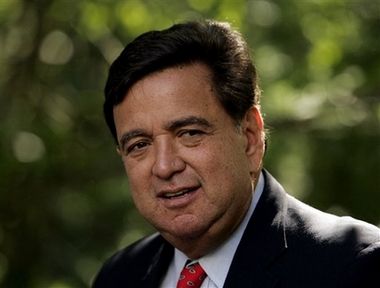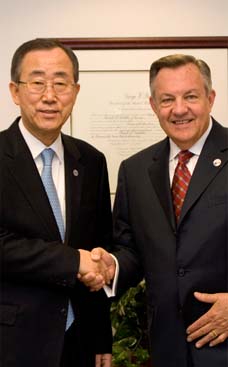
"Youth should be encouraged to engage in public service because I think it can benefit a country and a people," Biklen said. "It has the potential to make people more sensitive to important social issues like environmental concerns, education, poverty and availability of health care." A former Peace Corps volunteer, Biklen said volunteering was popular in the Kennedy era, and many of his peers who were involved in public service ended up in careers that were related to public service. Richardson's education plan states that "a large number of service commitments will be eligible for the loan-payment-for-service program: the Peace Corps, AmeriCorps, Teach for America, firefighters, police officers, public interest attorneys who earn less than $45,000 per year and the National Health Service Corps, as well as teachers and medical professionals in underserved areas."
Sierra Leone RPCV Douglas Biklen thinks Richardson's plan is good but complex
Something to serve for
New plan calls for free higher education for public service
Nicole Loring
Issue date: 11/8/07 Section: News
The cost of a college education may drop for civic-minded students if Bill Richardson becomes president.
In his recently published education plan, the New Mexico governor and 2008 Democratic presidential candidate stated that if elected, he would offer two years of loan forgiveness - the cancellation of part or all of an educational loan by the federal government - to pay for students' tuition costs at public universities in exchange for one year of public service.
Richardson's plan also calls to discard the No Child Left Behind Act and to offer incentives for colleges to keep their costs down. The loan forgiveness plan assumes the average public university tuition to be $6,000 per year, which would be adjusted yearly to accommodate for changing costs.
The Syracuse University community seems to be enthusiastic about the plan, citing its potential to provide affordable higher education while at the same time sponsoring widespread public service. However, some raised concerns about the feasibility of the program, as well as questions about how the plan might harm private institutions like SU.
Douglas Biklen, dean of the School of Education, thought Richardson's plan was a good but complex, noting there would be debates about what would count as public service as well as the plan's high yearly cost.
"Youth should be encouraged to engage in public service because I think it can benefit a country and a people," Biklen said. "It has the potential to make people more sensitive to important social issues like environmental concerns, education, poverty and availability of health care."
A former Peace Corps volunteer, Biklen said volunteering was popular in the Kennedy era, and many of his peers who were involved in public service ended up in careers that were related to public service.
Richardson's education plan states that "a large number of service commitments will be eligible for the loan-payment-for-service program: the Peace Corps, AmeriCorps, Teach for America, firefighters, police officers, public interest attorneys who earn less than $45,000 per year and the National Health Service Corps, as well as teachers and medical professionals in underserved areas."
The plan also includes military service as public service, stating that loan forgiveness would be provided in addition to military educational programs such as the G.I. Bill. Loan forgiveness would apply to all post-secondary education institutions, including community colleges, four-year bachelor's programs, master's programs, professional schools, doctorates and medical degrees.
Richardson's plan shares similarities to the U.S. Public Service Academy, the brainchild of co-founders Chris Asch and Shawn Raymond. The future institution would be the civilian counterpart to West Point, providing a free four-year education in exchange for five years of public service.
In contrast to Richardson's idea, which offers loan forgiveness at existing schools, the academy is a "flagship institution to raise public leadership," said Asch, who visited SU in October to speak about the academy, in a phone interview.
"I applaud Bill Richardson for helping to encourage public service and for addressing a critical issue - the need for young people to go into public service," Asch said. He added that the academy would be better suited to meeting the needs of the public service sector, as opposed to private service firms.
Asch also noted the cost difference between the two ideas - the academy is estimated at $205 million, while Richardson's plan would cost about $3.6 billion per year.
At Syracuse, students like senior Chris Lloyd are unconvinced about the feasibility of Richardson's plan.
"His idea is laudable, but it sounds like a lot of the public service he suggests would require that you have money to start out with or a college degree, like for practicing medicine," the history and philosophy major said.
Biklen said the idea could be popular among students and their families.
"Particularly for first-generation college goers, the finances of not only paying for college but also the lost salary are reasons why people leave college."
One concern Biklen brought up about this proposal was whether untrained young people would be asked to do jobs for which they were unqualified, such as teaching high-needs children. He also said Richardson's idea was not radical, mentioning that loan forgiveness programs already exist in medical and education fields.
Africa Belgrave, a College of Arts and Sciences junior, said if Richardson's program had been available to her in high school, she would have chosen to go to a public university instead of Syracuse. "For two years of free tuition? Definitely," she said.
Freshman Sean O'Connell said he would have also chosen a public university under Richardson's plan.
"The big factor is money," said the music composition major, adding that students may be more likely to attend private universities if a tuition cut were offered in exchange for public service.
SU does not offer loan forgiveness to students who volunteer in the public sector, said Interim Director of Financial Aid Kaye DeVesty.
"I think that we would be unhappy if Syracuse University students weren't eligible for this plan," DeVesty said. She was unsure whether SU might try to give its own loan forgiveness if Richardson's plan excluded private institutions.
"I don't know how we would make a counteroffer - we just haven't thought of it," DeVesty said. "We certainly want students to take advantage of this if they were coming to Syracuse, so that would be a loss for us."
If the bill were passed, Biklen said private universities would probably lobby to have a comparable program so that loan forgiveness would be offered to students at private schools.
"I would guess that if Congress were to legislate this at the request of a president, we'd see a lot of tweaking of the funding formula so that private institutions would be included," he said.
The biggest issue with Richardson's plan would be cost, Biklen said. "It's not based on family wealth or personal wealth, so it becomes potentially costly," said Biklen, noting that some small government groups might be opposed to the plan if they thought the government was getting involved in something it shouldn't.
Asch, the academy co-founder, said public service needs to be encouraged. "We as a culture have grown away from thinking higher education needs to serve the public good - we think of it as a private good that benefits individuals. People think it's a right that everyone should be able to have, rather than a privilege that entails civic responsibility," he said.
Richardson's plan would be ideal for students who wanted to take a year off before college, O'Connell said. "This would give them more incentive to do that. If they're on the edge, it would allow them to go out into the world, make a difference and be able to go to college with better financial aid later on," he said.
If passed, the proposal "could potentially open the debate for why is higher education so expensive and maybe call for reducing the cost of higher education," Biklen said.
"This is a little different approach" toward making college more affordable for students, DeVesty said. "So why not at least try it?"













